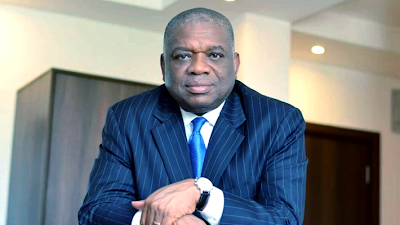The Economic and Financial Crimes Commission (EFCC) has urged the Court of Appeal, Abuja to nullify the Federal High Court ruling that stopped the retrial of Orji Kalu, a former governor of Abia State, over a N7 billion fraud case.
This is contained in a notice of appeal filed by EFCC against the September 29, 2021 judgment of Inyang Ekwo of the Federal High Court in Abuja prohibiting the commission from retrying Kalu.
The commission similarly filed a separate notice of appeal in respect of Kalu’s firm, Slok Nigeria Limited, which Ekwo also shielded from the retrial.
Previously convicted of the charges, Kalu, a serving senator representing Abia North, was already serving a 12-year jail term for the offences when the Supreme Court, on May 8, 2020, nullified the proceedings leading to his and his co-defendants’ conviction.
The Supreme Court’s judgment delivered on an appeal by Kalu’s co-defendant, Ude Udeogu, also ordered a retrial.
The apex court anchored its decision on the grounds that the trial, the previous trial was unconstitutional because the trial judge, Mohammed Idris, lacked the jurisdiction to conduct the proceedings and deliver judgement after he had been elevated to the Court of Appeal.
Kalu, the incumbent Chief Whip of the Nigerian Senate, got out of prison on the apex court’s judgment by citing it in an application he filed before A.M Liman of the Federal High Court in Lagos, who promptly quashed his conviction and ordered his release.
But as soon as EFCC made a move to enforce the apex court’s order for a retrial, Kalu and his firm quickly filed separate applications before Ekwo, to whom the criminal case was reassigned, to stop their retrial.
Ruling on the separate applications filed by Mr Kalu and his firm, Mr Ekwo held on September 29, that the applicants cannot be prosecuted afresh in the absence of any specific order directed at them.
Mr Ekwo insisted in the judgments that it was Mr Udeogu who appealed to the Supreme Court that was ordered to be prosecuted, and not Mr Kalu or his firm.
Displeased with the decisions, the EFCC, through the prosecuting counsel, Rotimi Jacobs, a Senior Advocate of Nigeria, urged the Court of Appeal in Abuja to set aside the judgement of the lower court and dismiss the cases filed by Mr Kalu and Slok Nigeria Ltd.
The notice of appeal against the judgment delivered in Mr Kalu’s favour has nine grounds of appeal while the one against the ruling involving Slok Nigeria Ltd has seven grounds.
In the two separate notices of appeal dated October 11, 2021, Mr Jacobs faulted Mr Ekwo’s reasoning which suggested that Mr Kalu’s retrial would amount to double jeopardy.
“The lower court excluded the most relevant evidence before it so as to shield the first respondent from criminal prosecution,” the EFCC said in its particulars of error faulting Mr Ekwo’s ruling.
The anti-graft agency argued that the judge erred in law when he, in one breath, agreed that the earlier trial, conviction and sentencing of Mr Kalu was nullified, but in another breath, held that a retrial would subject the former governor to double jeopardy.
Questioning the legal reasoning of the judge, the EFCC argued: “That the plea of autrefois acquit and autrefois convict (previously acquitted and previously convicted) and the principle of jeopardy availed the first respondent (Kalu) and that the re-trial of the respondent would amount to the violation of the provisions of Section 36 (9) and (10) of Constitution Federal Republic of Nigeria 1999 (as amended) and Section 238 of the Administrator of Criminal Justice Act, 2015,” was wrong.
“The lower court failed to consider the decisions of the Supreme Court and the Court of Appeal cited before it to the effect that the doctrine of double jeopardy or autrefois convict is only applicable to a decision delivered by a court of competent jurisdiction.”
Similarly, EFCC, through its lawyer, picked holes in Mr Ekwo’s order prohibiting the federal government and its agencies from retrying Mr Kalu and his company on the same case.
Mr Jacobs noted: “The evidence before the lower court was that the Supreme Court, in appeal No: SC.622C/2019 between Ude Jones Udeogu v. FRN had nullified the proceedings conducted by Hon. Justice M.B Idris that led to the convictions and sentence of all the respondents in this appeal.
“However, it was only Ude Jones Udeogu that was the appellant. Since it was a joint trial of all the respondents, the first respondent, by his motion filed on May 15, 2020 prayed the Federal High Court presided over by Justice A. M. Liman that the proceedings that led to his conviction be nullified on the ground that Hon. Justice M.B Idris, JCA lacks jurisdiction to deliver the judgment in line with the decision of the Supreme Court.”
He further challenged the trial court for holding that Mr Kalu could not be tried again by the Federal High Court on the grounds that the Supreme Court did not order his re-trial.
‘Taking benefit without liability’
He noted that although it was based on the appeal filed by Mr Udeogu that the Supreme Court voided the proceedings leading to their conviction and sentence, Mr Kalu tendered the Supreme Court judgment before another judge of the Federal High Court (Mr Liman) who applied the judgment to him and ordered is release from prison on that basis of the judgment.
“The pronouncement of the Supreme Court as to the competence of the trial conducted by Hon. Justice MB ldris and the re-trial order in appeal No: SC.622C/2019 was limited to the said second respondent herein (Udeogu).
“The first respondent took advantage of the decision of the Supreme Court in appeal No: SC.622C/2019 and filed a motion before Hon. Justice A. M. Liman that since he was tried jointly with the other respondents and in view of the decision of the Supreme Court, that his conviction and sentence should also be declared a nullity.
“The lower court permitted the first respondent to rely on the decision of the Supreme Court in appeal No: SC.622C/2019 to take benefit of the order of nullity made by the Supreme Court on the judgment of Hon. Justice M. B. Idris and to avoid the burden of a retrial order made by the Supreme Court.
“The law will not permit the first respondent to approbate and reprobate at the same time,” Mr Jacobs wrote in the notice of appeal.
The EFCC further faulted the trial court for holding, among others, that “the appellant (EFCC) was merely appealing to the sentiments for the retrial of the first respondent and that the entire proceedings in exhibit RJ3 and RJ4 have no bearing with the proceedings of the court in this case.”
Mr Jacobs pointed out to Exhibit RJ3 as the motion on notice which Mr Kalu filed to quash the proceedings conducted by Federal High Court in Lagos, and Exhibit RJ4, the order made by the judge, Mr Liman, on June 30, 2020, which set aside the proceedings conducted by the former trial judge in line with court’s judgement and ordered his release from prison.
“It was pursuant to exhibits RJ3 and RJ4 that the first respondent was released from the prison on the grounds that the judgment delivered by Hon. Justice M. B. Idrs JCA was a nullity.
“It is shocking that the order of competent jurisdiction made by Hon. Justice A.M. Liman was declared by the lower court as irrelevant to the proceedings.
“There is no appeal against the decision and order of Hon. Justice A. M. Liman pending before E. I. Ekwo.
“E.I Ekwo . sat on appeal against the order of Hon. Justice A.M Liman, setting aside the judgment delivered on the 5th December, 2019 after the elevation of on Justice M. B. Idris ground of jurisdiction,” the EFCC argued.
The commission canvassed similar grounds of appeal in the appeal against Mr Ekwo’s ruling concerning Slok.
(Premium Times)















